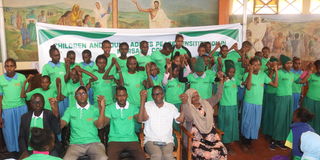Marsabit turns to learners to promote peace

Marsabit deputy county commissioner David Saruni (in white shirt) flanked by county director of Tourism, Culture, and Gender Ann Jillo hold hands in solidarity with student representatives from conflict zones at Manyatta Jillo Catholic School on October 8, 2022.
When violent conflicts occur in Marsabit, children are immensely affected, with many killed, maimed, traumatised or even displaced from their homes.
Though children undergo such trauma, their visibility and voices have always largely lacked in the county’s peacebuilding, observed Marsabit Deputy County Commissioner David Saruni.
“I believe that approaching peacebuilding as a component of a pacification strategy to [prevent youth and children from being] involved in ethnic violence is one of the most suitable methods that can help heal the hurting parents and children among the warring communities in Marsabit,” Mr Saruni said.
He lauded recent initiatives launched by peace actors involving school children, saying they were key in promoting peacebuilding.
Children’s awareness, attitudes, mindset change, and behaviours are important in the success of peacebuilding and uprooting deep-seated animosity.
Mr Saruni spoke during a peace meeting that brought together 10 primary school students from Marsabit Central, Turbi and Maikona sub-counties at Manyatta Jillo Primary School on Saturday.
The meeting was organised by Nawiri, Child Fund and Interpeace, to reconcile the children of the Rendille, Gabbra and Borana communities.
Mr Saruni was optimistic that such dialogues would help shape attitudes and relationships, boosting cohesion among members of antagonistic communities in the region.
He said Kenya Vision 2030, under its social pillars, underscored the promotion of a just and cohesive society with equitable social development and a clean and secure environment.

Pupils representatives from 10 primary schools in Marsabit sing peace songs during a meeting at Manyatta Jillo Primary on October 8, 2022.
But he said he was saddened that little focus had been put on peacebuilding activities by women and children though these groups bear the brunt of violent conflicts.
Children and learning were disrupted by ethnic conflicts in the county, especially between 2015 to 2022, said Galgallo Guyo, Marsabit Central sub-county chairperson of the Kenya Primary Schools Heads Association (Kepsha).
In some instances, learners had to flee their homes with their parents or sleep in the bush and go to school the following day.
Some schools, such as Manyatta Jillo, turned into war zones, with learners and teachers caught in the crossfire and others even shot dead.
At Manyatta Jillo, 12 of 17 teachers wrote to the Teachers Service Commission saying they feared for their lives and demanded transfers.
Schools such as Gufu Ali and Lagdima had to close because of the incessant ethnic violence and have not reopened.
Mr Guyo said children suffered the brunt of intertribal conflicts but they were excluded from peacebuilding or their potential in such efforts were disregarded.

Pupils representatives from 10 primary schools in Marsabit sing while wielding a banner of peace during a meeting at Manyatta Jillo Primary on October 8, 2022.
He wanted children to be incorporated into the enhanced peacebuilding process through music, peace movements, civic participation and sports. He also said schools should be set up on the borders of warring communities where learners and teachers from the communities work together.
Children should be trained to use songs for psychosocial healing in post-conflict peacebuilding,” said Maiokona Primary School headteacher Hassan Duba.
He said children could also be taught to use art and theatre to disseminate peace messages on topics such as reconciliation, customs, morality, suffering human rights, domestic violence and politics.
Children in northern Uganda used art and theatre to disseminate peace messages on topics such as politics, reconciliation, customs, morality, suffering, security, human rights and domestic violence.
Everline Leyala, a student at Leyai Primary School, Gumat Chorkolet (Hula Hulla Primary), Elizabeth Kabale (Manyatta Jillo Primary) and Gumato Halkano (Daaba Primary) recounted how they were affected by ethnic conflicts.
They said children from the Rendille, Gabbra, and Borana communities developed mistrust against one another because of the animosity among their parents.
But they were excited that peace actors had initiated eye-opening programmes that had helped them reconcile and rebuild trust with learners from other communities.
Nawiri and Child Fund Project Coordinator William Waithaka explained that their programmes sought to enhance children’s visibility in promoting peace and reconciliation.
He estimated that 90 percent of children in conflict hotspots in Marsabit were grappling with mental problems as they were unable to forget the disturbing scenes of ethnic conflicts.
Thus the children were both victims of conflicts and agents of peace.
Through the conversations with families, school teachers, administrators, and learners, peace agents hoped to influence public policies that could help children live cohesively in conflict-affected areas in Marsabit, said National Cohesion and Integration Commission (NCIC) and Interpeace programme coordinator David Narupe.
“We strongly believe that roping children in peacebuilding and reconciliation, particularly through peacebuilding interventions in schools, could eventually help to realise a more cohesive society,” Mr Narupe said.





